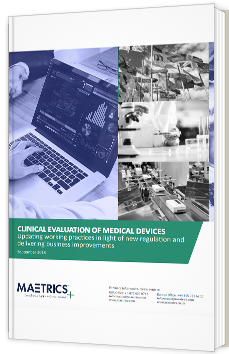

Mise à jour des pratiques de travail à la lumière de la nouvelle réglementation et apporter des améliorations commerciales.

"Every medical device sold into Europe, irrespective of its classification, must have an up-to-date Clinical Evaluation Report (CER) as part of its Technical File. Since our last update on CER execution a renewed guidance in the form of MEDDEV 2.7/1 Rev. 4 was released in June 2016.
Nevertheless there continues to be a lack of clarity on the approach and requirements for manufacturers. This lack of clarity continues to lead to varying approaches to the CER process by manufacturers and Notified Bodies (NBs), resulting in uncertainty for manufacturers as to whether their CER process will be considered compliant and their medical devices adequately supported.
Experience working across the scope of medical devices on the market has meant that we have seen the impact of good practice and pro-active implementation of CER within organisations. Not only are businesses able to keep their products on the market, but they can avoid costly recalls and the reputational damage that this can lead to, especially given the speed at which information circulates over social media. Having to repeat reviews of clinical data in response to deficiencies is also highly time-consuming and a drain on resources so should preferably be carried out efficiently the first time.
Efficient management of the CER process can help improve risk management and Post Market Surveillance (PMS), while pro-active updating of CERs, driven by on-going monitoring of literature and publications, is an interesting and highly effective way of ensuring that, when a CER is due for review, there are only a few recent updates to make rather than starting the process of reviewing years of literature from scratch. Finally, the proactive review of the CER process can help businesses gain efficiencies such as covering more than one product with a single CER and reducing the overall number of reviews required. This type of in-depth analytical approach to CERs can help rationalize product portfolio, shorten time to market for new devices and help speed-up and make improvements to new product design at the R&D stage as well as help manage claims-such as those on labelling. Marketing can also benefit from a deeper and more up-to-date insight on the company’s products, but ultimately all these efficiencies contribute to increasing the bottom-line and to making the business more profitable."